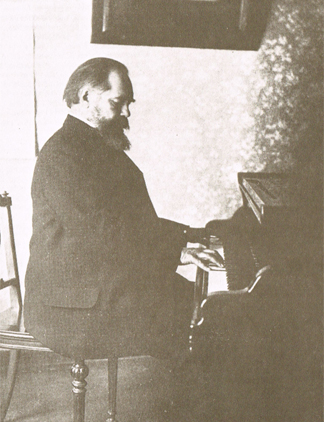That BCMS has performed music by Johannes Brahms (1833-1897) more than any other composer may speak to the comfort and completeness it evokes fulfilling the ideals of the German Romantic spirit, whether the sense of life as journey from home– through nature–to final rest, or the bittersweet recollection of love found, and lost.
Music by Sergei Taneyev (1856-1915), the man often referred to as the Russian Brahms, is among the least familiar to BCMS audiences in part because it arrived late to our repertoire midway through our history at a time when his music was being re-discovered and revisited worldwide. My first encounter was at the Sitka (Alaska) Summer Music Festival where I played for more than thirty years. Taneyev’s music was especially welcome by audiences in a town that had once been the North American Russian capital. It is from there that interest, particularly in the chamber music, spread east to the rest of us.

We have chosen to pair great chamber works by these two great composers in two winter concerts at MIT (December and January) to enjoy their differences as much as marvel at what they display in common. Besides their obvious physical resemblances and contemporaneous careers, these composers were each products of musical families, great pianists (Taneyev debuted in Brahms’s D minor Concerto), protégés and colleagues of great older composers (Schumann, Tchaikovsky). Each believed in the power of his native folk music and in the need for mastering contrapuntal techniques of the past as the basis for creating new music of artistic significance. Like Brahms, who stood alone writing in classical forms his contemporaries relegated to the past, Taneyev remains a singular figure for abandoning indigenous Russian musical tradition and nationalism in favor of more abstract concepts.
When asked earlier this year to create a playlist of Russian music for a colleague, particularly music that displayed Russian bells, after Tchaikovky’s 1812 Overture my thoughts turned immediately to the conclusion of Taneyev’s Piano Quintet in G minor, Op. 30. A more exuberant and joyous conclusion marked by the chiming of imaginary church bells is difficult to find in all of Russian music!
Taneyev’s Piano Quintet was premiered in Moscow in 1911 and last played by BCMS in 1997. (By then I had already performed it a decade before in Moscow, Leningrad, and Tashkent. Members of the Taneyev String Quartet attended our first concert.)
His String Quintet (with two cellos) Op. 14 in G (1904) was performed by BCMS in 2000. The performance of its companion piece, String Quintet (with two violas) Op. 16 (1905) in C will close our January concert as a Boston Premiere!
Enjoy!
Marcus
